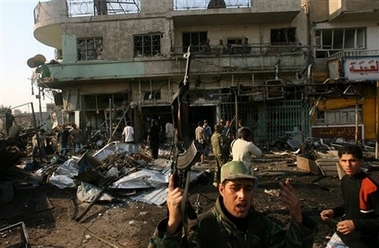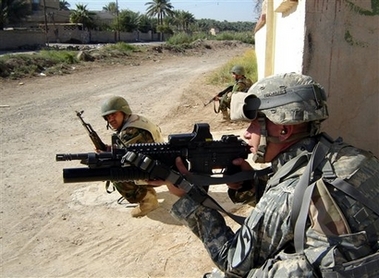US VP Dick Cheney in Baghdad - TV
(AP)Updated: 2006-11-23 16:44
"I was surprised by the heavy shooting on our minivan. I was hit badly in my left hand," said one worker, Ahmed Gatie, 24, as he was treated at Imam Ali hospital. "I can only feed my family when I work. What will happen now?"
|
Witness Salah Salman, 24, said he and other local residents helped police carry victims of the attack from the minivan to the morgue and hospital.
The raid came weeks after Prime Minister Nouri al-Maliki, a Shi'ite, ordered the US military to lift a blockade of the sprawling east Baghdad grid of streets lined with tumbledown concrete block structures and vacant lots.
American forces had sealed the district for several days looking for kidnapped US soldier Ahmed Qusai al-Taayie, a 41-year-old reservist from Ann Arbor, Michigan. He was visiting his Iraqi wife in Baghdad on Oct. 23 when he was handcuffed and abducted by suspected rogue gunmen from the Mahdi Army.
Al-Sadr is a major political backer of al-Maliki, who had rejected American demands to disband the heavily armed militias and their death squads, which have carried out a brutal campaign of revenge attacks on Iraq's Sunni minority in a cycle of violence following the Feb. 22 bombing of a Shi'ite shrine.
But Al-Maliki has looked the other way during the most recent joint US-Iraqi raids, an about-face his aides said was prompted by anger over the U.S. soldier's abduction and a mass kidnapping carried out by suspected Mahdi Army gunmen. Dozens of gunmen in police uniforms kidnapped scores of people during the raid on a Ministry of Higher Education office in Baghdad on Nov. 14. The ministry is predominantly Sunni Arab.
At least 101 Iraqis were killed Wednesday and the UN reported that 3,709 Iraqi civilians were killed in October, the highest monthly toll of the war and one that is likely to be eclipsed when November's dead are counted.
The United Nations Assistance Mission for Iraq also said that citizens were fleeing the country at a pace of 100,000 each month, and that at least 1.6 million Iraqis have left since the war began in March 2003.
Life for Iraqis, especially in Baghdad and cities and towns in the center of the country, has become increasingly untenable. Many schools failed to open at all in September, and professionals - especially professors, physicians, politicians and journalists - are falling to sectarian killers at a stunning rate.
Lynchings have been reported as Sunnis and Shi'ites conduct a merciless campaign of revenge killings.
The UN figure for the number of killings in October was more than three times the 1,216 tabulated by The Associated Press and nearly 840 more than the 2,870 US service members who have died during the war.
The US military on Thursday reported the deaths of three Marines in fighting in Anbar province, where many Sunni Arab insurgents are based.
So far this month, 52 American service members have been killed or died.
 | 1 | 2 |
|
||
|
||
|
|

